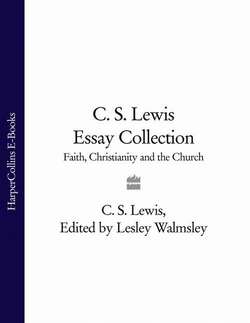Читать книгу C. S. Lewis Essay Collection: Faith, Christianity and the Church - Клайв Льюис, Клайв Стейплз Льюис, C. S. Lewis - Страница 19
II
ОглавлениеTo the Editor of Theology:
Sir,
Mr Bethell’s main position is so important that I hope you will allow me at some future date to deal with it in a full-length argument. For the moment, therefore, I will only say: (1) That I made no reference to his previous paper for the worst of reasons and the best of causes– namely, that I had forgotten it. For this negligence I ask his pardon. On looking back at the relevant number of Theology, I see from marginalia in my own hand that I must have read his contribution with great interest; for my forgetfulness I can only plead that a great many things have happened to us all since then. I am distressed that Mr Bethell should suppose himself deliberately slighted. I intended no disrespect to him. (2) That my position ‘logically implies…total depravity’ I deny simply. How any logician could derive the proposition ‘Human nature is totally depraved’ from the proposition ‘Cultural activities do not in themselves improve our spiritual condition’, I cannot understand. Even if I had said (which I did not), ‘Man’s aesthetic nature is totally deptaved’, no one could infer ‘Man’s whole nature is totally depraved’ without a glaring transference from secundum quid to simpliciter. I put it to Mr Bethell that he has used ‘logically implies’ to mean ‘may without gross uncharity rouse the suspicion of–and that he ought not to use words that way.
To Mr Carritt I reply that my argument assumed the divinity of Christ, the truth of the creeds, and the authority of the Christian tradition, because I was writing in an Anglican periodical. That is why Dominical and patristic sayings have for me more than an antiquarian interest. But though my attribution of authority to Christ or the Fathers may depend on premises which Mr Carritt does not accept, my belief that it is proper to combine my own reasonings with the witness of authority has a different ground, prior to any decision on the question, ‘Who is authoritative?’ One of the things my reason tells me is that I ought to check the results of my own thinking by the opinions of the wise. I go to authority because reason sends me to it–just as Mr Carritt, after adding up a column of figures, might ask a friend, known to be a good calculator, to check it for him, and might distrust his own result if his friend got a different one.
I said that culture was a storehouse of the best sub-Christian values, not the best sub-Christian virtues. I meant by this that culture recorded man’s striving for those ends which, though not the true end of man (the fruition of God), have nevertheless some degree of similarity to it, and are not so grossly inadequate to the nature of man as, say, physical pleasure, or money. This similarity, of course, while making it less evil to rest in them, makes the danger of resting in them greater and more subtle.
The salvation of souls in a means to the glorifying of God because only saved souls can duly glorify Him. The thing to which, on my view, culture must be subordinated, is not (though it includes) moral virtue, but the conscious direction of all will and desire to a transcendental Person in whom I believe all values to reside, and the reference to Him in every thought and act. Since that Person ‘loves righteousness’ this total surrender to Him involves Mr Carritt’s ‘conscientiousness’. It would therefore be impossible to ‘glorify God by doing what we thought wrong’. Doing what we think right, on the other hand, is not the same as glorifying God. I fully agree with Mr Carritt that a priori we might expect the production of whatever is ‘good’ to be one of our duties. If God had never spoken to man, we should be justified in basing the conduct of life wholly on such a priori grounds. Those who think God has spoken will naturally listen to what He has to say about the where, how, to what extent, and in what spirit any ‘good’ is to be pursued. This does not mean that our own ‘conscience’ is simply negated. On the contrary, just as reason sends me to authority, so conscience sends me to obedience: for one of the things my conscience tells me is that if there exists an absolutely wise and good Person (Aristotle’s raised to the nth) I owe Him obedience, specially when that Person, as the ground of my existence, has a kind of paternal claim on me, and, as a benefactor, has a claim on my gratitude. What would happen if there were an absolute clash between God’s will and my own conscience–i.e. if either God could be bad or I were an incurable moral idiot–I naturally do not know, any more than Mr Carritt knows what would happen if he found absolutely demonstrative evidence for two contradictory propositions.
I mentioned Hooker, not because he simply denied that Scripture contains all things necessary, but because he advanced a proof that it cannot–which proof, I supposed, most readers of Theology would remember. ‘Text-hunting’ is, of course, ‘Puritanical’, but also scholastic, patristic, apostolic, and Dominical. To that kind of charge I venture, presuming on an indulgence which Mr Carritt has extended to me for nearly twenty years, to reply with homely saws: as that an old trout can’t be caught by tickling, and they know a trick worth two of that where I come from. Puritan, quotha!
Yours faithfully, C.S. Lewis
